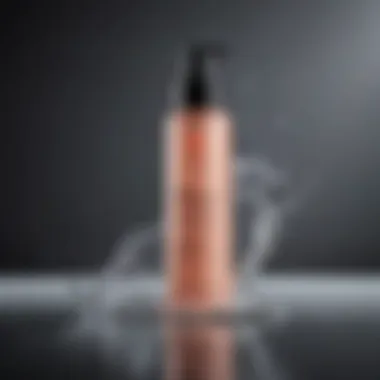Discover the Perfect Cleanser for Acne-Prone Skin with This Definitive Guide


Beauty Tips and Tricks
When it comes to acne-prone skin, choosing the right cleanser is paramount. Cleansers play a vital role in managing breakouts and maintaining skin health. With the myriad of options available in the market, understanding your skin's needs is key to making an informed decision. In this section, we will delve into the essential factors to consider when selecting a cleanser for acne-prone skin.
Skin Type Assessment
Before delving into the world of cleansers, it is crucial to determine your skin type. Acne-prone skin can be oily, dry, combination, or sensitive. Identifying your skin type will help narrow down the vast array of products and prevent further breakouts or irritations.
When assessing your skin type, examine factors such as oiliness, sensitivity, and existing skin conditions. Knowing your skin type will guide you in selecting a cleanser that addresses your skin's unique needs without causing imbalance or aggravating existing concerns.
Ingredients to Look For
When choosing a cleanser for acne-prone skin, the ingredients list is your best friend. Opt for cleansers that contain salicylic acid, benzoyl peroxide, glycolic acid, or tea tree oil. These ingredients are known for their acne-fighting properties and can help unclog pores, reduce inflammation, and prevent future breakouts.
Additionally, look for non-comedogenic and fragrance-free formulas to avoid triggering skin reactions. Fragrances and comedogenic ingredients can exacerbate acne and cause further skin irritation. By prioritizing gentle, non-irritating ingredients, you can effectively cleanse your skin without compromising its balance.
Cleansing Techniques
Incorporating the right cleansing technique is as important as choosing the right product. When washing your face, use lukewarm water to open up the pores and allow the cleanser to penetrate effectively. Gently massage the cleanser onto your skin in circular motions, focusing on areas prone to breakouts.
Avoid harsh scrubbing or overwashing, as this can strip the skin of its natural oils and lead to increased sebum production. Opt for a gentle, foaming cleanser that effectively removes impurities without over-drying the skin. Following up with a lightweight, oil-free moisturizer will help maintain hydration levels and balance the skin's moisture barrier.
By honing in on your skin type, selecting the right ingredients, and mastering the art of cleansing, you can cultivate a skincare routine tailored to your acne-prone skin's needs. Empower yourself with knowledge and make informed choices that promote clear, healthy skin.


Understanding Acne-Prone Skin
Acne-prone skin, a common dermatological condition, necessitates a nuanced approach to skincare. Understanding this skin type holds paramount importance in navigating the maze of cleansers available in the market. For individuals grappling with acne, comprehending the underlying causes and characteristics of this condition is crucial. By delving into the intricacies of acne-prone skin, we equip ourselves with the knowledge needed to address its specific needs effectively. Notably, acne-prone skin is characterized by an overproduction of sebum, clogged pores, and the potential for inflammation and breakouts. This knowledge acts as a compass, guiding individuals towards the most suitable products for their unique skin concerns.
Overview of Acne
Acne, a multifaceted skin condition, manifests in various forms such as blackheads, whiteheads, papules, pustules, nodules, and cysts. The development of acne is intricately linked to factors like excess sebum production, bacterial proliferation, inflammation, and hormonal fluctuations. Understanding the diverse presentations of acne is crucial for implementing an effective skincare regimen. From mild to severe cases, acne can significantly impact one's self-esteem and quality of life. By examining the different types and causes of acne, individuals can make informed choices in selecting the most appropriate cleansers to manage and prevent breakouts.
Factors Contributing to Acne
Several factors can contribute to the exacerbation of acne, including genetic predisposition, hormonal fluctuations, dietary habits, stress levels, and skincare products. Genetic factors play a significant role in determining an individual's susceptibility to acne, shaping the skin's response to environmental triggers. Hormonal imbalances, especially during puberty, menstrual cycles, or pregnancy, can trigger sebum overproduction, leading to clogged pores and acne formation. Environmental factors like pollution and humidity can also influence acne development. Understanding these multifaceted influences helps individuals adopt a holistic approach to managing acne.
Importance of Choosing the Right Cleanser
The significance of selecting an appropriate cleanser for acne-prone skin cannot be overstated. A well-chosen cleanser can help maintain the skin's p H balance, unclog pores, reduce excess oil, and prevent inflammation. Cleansers containing active ingredients like salicylic acid, benzoyl peroxide, tea tree oil, and witch hazel target acne-causing bacteria, exfoliate dead skin cells, and soothe inflamed skin effectively. Moreover, choosing a non-comedogenic formula helps prevent pore blockages, thus reducing the risk of breakouts. By choosing the right cleanser, individuals can proactively manage their acne-prone skin, promoting clarity and health.
Types of Cleansers for Acne-Prone Skin
In the realm of skincare, the significance of choosing the appropriate cleanser for acne-prone skin cannot be overstated. From deeply ingrained impurities to excess sebum production, individuals grappling with acne face a myriad of unique challenges. Embracing an efficacious cleansing routine serves as the cornerstone for fostering clear, healthy skin. When contemplating the vast array of cleansers available, understanding the nuances of foaming, cream, gel, and oil-based options becomes paramount.
Foaming Cleansers
Foaming cleansers, lauded for their ability to deeply cleanse the skin's pores, hold a steadfast place in the skincare repertoire of many. Composed of effective surfactants, these cleansers work tirelessly to eliminate impurities and excess oil, offering a rejuvenating cleanse. For individuals with acne-prone skin, the delicate balance between thorough cleansing and skin hydration is crucial. Therefore, opting for a foaming cleanser tailored to acne-prone skin can aid in regulating sebum levels while thwarting potential breakouts. Engaging with dermatologist-recommended foaming cleansers ensures a gentle yet efficacious cleansing experience.


Cream Cleansers
Contrasting the foaming variety, cream cleansers epitomize gentle yet effective cleansing for acne-prone skin. Their velvety texture and moisture-rich composition make them a soothing choice for individuals requiring a more tender touch in their skincare routine. Cream cleansers perform admirably in dissolving impurities without stripping the skin of its natural oils, a common concern for those battling acne. Moreover, the nurturing properties of cream cleansers provide a much-needed sense of comfort and hydration, fostering a balanced complexion while combating blemishes.
Gel Cleansers
Enter the realm of gel cleansers, celebrated for their lightweight consistency and clarifying prowess. An excellent choice for individuals with acne-prone skin, gel cleansers boast a refreshing and invigorating cleansing experience. With their ability to penetrate deep into pores, gel cleansers effectively remove impurities and excess sebum, promoting a clearer complexion. Opting for gel cleansers formulated with acne-fighting ingredients can further elevate their efficacy, assisting individuals in attaining radiant, blemish-free skin.
Oil-Based Cleansers
Oil-based cleansers, despite contradicting conventional beliefs, present a compelling option for individuals combating acne. Employing the principle of 'like dissolves like,' oil-based cleansers demonstrate remarkable efficacy in dissolving pore-clogging impurities and stubborn makeup residue. Contrary to misconceptions, oil-based cleansers do not exacerbate acne but rather offer a gentle yet thorough cleansing ritual. By incorporating oil-based cleansers into their skincare regimen, individuals with acne-prone skin can achieve a pristine complexion without compromising on hydration or exacerbating breakouts.
Key Ingredients Guide: Selecting the Best for Acne-Prone Skin
Choosing the right cleanser for acne-prone skin involves considering key ingredients that play a crucial role in maintaining skin health. Various elements stand out for their benefits and considerations, making them essential components in acne skincare routines.
Salicylic Acid: The Acne-Fighting Warrior
Salicylic Acid is a renowned acne-fighting ingredient known for its ability to exfoliate the skin and unclog pores. This beta hydroxy acid penetrates deep into the pores, effectively removing excess oil and dead skin cells. Its anti-inflammatory properties help reduce redness and swelling, making it a valuable addition to cleansers designed for acne-prone skin.
Benzoyl Peroxide: The Bacteria Slayer
Benzoyl Peroxide is a potent ingredient that combats the bacteria responsible for acne breakouts. It works by introducing oxygen into the pores, creating an inhospitable environment for acne-causing bacteria to thrive. Additionally, Benzoyl Peroxide has exfoliating properties that help prevent pores from becoming clogged, making it a popular choice in acne cleansers.


Tea Tree Oil: Nature's Antiseptic
Tea Tree Oil is a natural antiseptic renowned for its antibacterial and anti-inflammatory properties. It helps soothe irritated skin and reduce acne-related redness and swelling. With its gentle yet effective nature, Tea Tree Oil is a popular choice for those looking for a botanical solution to acne-prone skin.
Witch Hazel: The Gentle Astringent
Witch Hazel is a gentle astringent that helps tighten pores and reduce inflammation. Its antioxidant properties make it a beneficial ingredient for soothing irritated skin and minimizing acne breakouts. Witch Hazel's ability to cleanse the skin without overdrying makes it a suitable choice for those with sensitive or combination skin types.
Choosing the Right Cleanser for Your Skin Type ###Choosing the Right Cleanser for Your Skin Type holds immense significance within the realm of skincare, particularly for individuals grappling with acne-prone skin. The selection of an appropriate cleanser tailored to your skin type can significantly influence the health and clarity of your skin. Understanding your skin type is crucial in determining the ideal cleanser that will effectively address your specific skin concerns. By choosing a cleanser compatible with your skin type, you can effectively manage oil production, hydration levels, and sensitivity. It is imperative to recognize that different skin types require different formulations to optimize cleansing without causing irritation or exacerbating existing skin issues. Diligently considering your skin type before selecting a cleanser can lead to enhanced skin health and a more effective skincare routine.
Oily Skin ###For individuals with oily skin, selecting the right cleanser is paramount in managing excess sebum production and preventing breakouts. Opt for foaming or gel-based cleansers that can effectively remove excess oil without overly drying out the skin. Look for cleansers containing salicylic acid, a beta-hydroxy acid renowned for its ability to unclog pores and regulate oil production. Salicylic acid can help combat acne lesions and prevent future breakouts, making it a valuable ingredient for oily skin types. Ensure that the cleanser is gentle yet potent enough to cleanse thoroughly without stripping the skin of essential moisture. Consistent use of a suitable cleanser for oily skin can help maintain a balanced complexion and minimize the risk of acne flare-ups. Dry Skin Individuals with dry skin must opt for hydrating and nourishing cleansers to prevent further dehydration and skin tightness. Cream cleansers enriched with hydrating ingredients such as glycerin, hyaluronic acid, or ceramides are ideal for dry skin types. These formulations help to cleanse the skin gently while replenishing moisture and fortifying the skin's natural barrier. Avoid harsh cleansers that contain alcohol or fragrances, as they can exacerbate dryness and cause irritation. Look for cleansers labeled as 'hydrating' or 'moisturizing' to ensure that your skin receives the necessary nourishment during the cleansing process. Regular use of a gentle cleanser suitable for dry skin can help maintain skin hydration and improve overall skin comfort. Combination Skin ###Navigating the realm of skincare for combination skin requires a balanced approach to cater to both oily and dry areas on the face. Opt for a gentle, p H-balanced cleanser that can effectively cleanse the skin without triggering excess oiliness or dryness. Gel cleansers with a mild formulation are well-suited for combination skin, as they can effectively remove impurities without disrupting the skin's natural balance. Seek out cleansers that contain gentle exfoliating ingredients like fruit enzymes or lactic acid to promote cell turnover and maintain skin clarity. Cleansing twice daily with a suitable cleanser for combination skin can help harmonize oil production and hydration levels, resulting in a more harmonious complexion. Sensitive Skin ###Sensitive skin requires extra care and consideration when selecting a cleanser to avoid irritation and inflammation. Look for fragrance-free and hypoallergenic cleansers specifically formulated for sensitive skin to minimize the risk of adverse reactions. Opt for gentle cream or milk cleansers that can cleanse the skin without stripping away its natural oils or causing redness. Ingredients like chamomile, aloe vera, or colloidal oatmeal can help soothe and calm sensitive skin while effectively cleansing impurities. Prioritize cleansers with minimal ingredients to reduce the likelihood of sensitivity or allergic reactions. Consistent use of a mild cleanser suitable for sensitive skin can help maintain skin integrity and alleviate discomfort associated with reactivity.
Tips for Effective Cleansing
In the realm of skincare, the paramount aspect that individuals, especially those combating acne, should bestow attention upon is the criticality of effective cleansing practices. The foundation of any skincare routine rests upon the efficacy of cleansing routines. By delving into the intricacies of effective cleansing, one unveils the gateway to a clearer, healthier complexion. This article elucidates not only the significance of cleansing but also navigates through the nuances of selecting the right type of cleanser tailored to acne-prone skin.
Double Cleansing Method
When contemplating optimal skincare practices, one cannot overlook the sanctity of the double cleansing method. This technique involves employing an oil-based cleanser initially to dissolve impurities such as makeup, sunscreen, and excess sebum, followed by a water-based cleanser to purify the skin further. The synergistic effect of this approach ensures a thorough and deep cleansing experience, eliminating impurities that may lead to acne flare-ups.
Frequency of Cleansing
Determining the frequency of cleansing forms a pivotal aspect in acne management. While it may be tempting to overcleanse the skin in a bid to eradicate acne, excessive washing can strip the skin of its natural oils, exacerbating the issue. On the contrary, inadequate cleansing may result in a buildup of sebum and debris, clogging pores and fostering the growth of acne-causing bacteria. Striking a fine balance by cleansing the skin twice a day can aid in maintaining optimal skin health, preventing breakouts effectively.
Patting Dry vs. Rubbing Dry
The seemingly mundane act of drying the face post-cleansing harbors implications for skin health. Patting the skin dry gently with a soft towel is advisable over rubbing vigorously. Harsh rubbing can not only irritate the skin but also compromise its integrity, leading to inflammation and potential breakouts. Opting for a patting motion helps maintain the skin's moisture balance while ensuring a gentle and non-abrasive drying process post-cleanse.
Consistency is Key
In the realm of skincare, consistency emerges as the linchpin of efficacy. Consistently adhering to a well-rounded skincare routine, inclusive of appropriate cleansing practices, establishes a conducive environment for achieving and sustaining clear, acne-free skin. Regularity in cleansing routines, coupled with the judicious choice of cleansers tailored to one's skin type, fortifies the skin's resilience against acne triggers, paving the path for a luminous and blemish-free complexion.







